

Untitled. Scientistic reductionism and the “dark side” of modern medicine: A personal reflection Bhaskara P Shelley Department of Neurology, Yenepoya Medical College, Yenepoya (Deemed to be) University, Mangalore, Karnataka, India Correspondence Address:Prof.
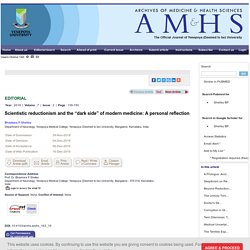
Dr. Jamanetwork. Importance Medical overuse is an important cause of patient harm and medical waste.
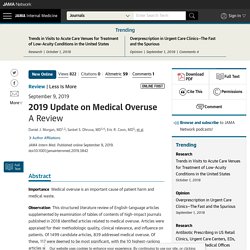
Observation This structured literature review of English-language articles supplemented by examination of tables of contents of high-impact journals published in 2018 identified articles related to medical overuse. Articles were appraised for their methodologic quality, clinical relevance, and influence on patients. Of 1499 candidate articles, 839 addressed medical overuse. Of these, 117 were deemed to be most significant, with the 10 highest-ranking articles selected by author consensus.
Conclusions and Relevance The findings suggest that many tests are overused, overtreatment is common, and unnecessary care can lead to patient harm. Why Doctors Still Offer Treatments That May Not Help. In the late 1970s, some doctors thought they had found a way to treat breast cancer patients with what would otherwise be lethal doses of chemotherapy.
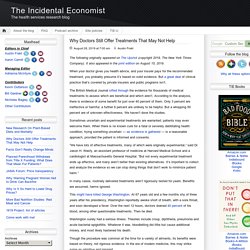
The approach involved harvesting bone marrow stem cells from the patients before treatment and reintroducing them afterward. Fueled by encouraging comments from doctors, the 1980s news media reported higher chemotherapy doses as the means to survival. Yet there was no compelling evidence that bone marrow transplants protected patients. South Africa's epidemic of over treatment could be killing us. Doctors in South Africa and abroad cause thousands of avoidable deaths each year by ordering unnecessary tests, surgeries and hospital admissions for their patients.
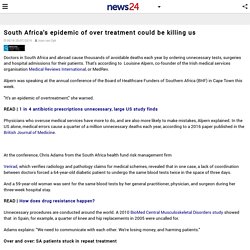
That's according to Louisine Alpern, co-founder of the Irish medical services organisation Medical Reviews International, or MedRev. Alpern was speaking at the annual conference of the Board of Healthcare Funders of Southern Africa (BHF) in Cape Town this week. "It's an epidemic of overtreatment," she warned. READ | 1 in 4 antibiotic prescriptions unnecessary, large US study finds. Getting at the roots rather than pruning the branches of overdiagnosis. Healthcare is in a tailspin as the rush to offer technology and services turns otherwise healthy people into concerned patients by identifying disease that is not destined to cause them harm. [1] As described in the many presentations at the 2018 Preventing Overdiagnosis conference, from cancers to rheumatology, to incidentalomas identified on imaging tests—the tree of overdiagnosis branches into many areas of medicine. [2-10] While usually based on well-intended efforts to identify disease at an early stage of diagnosis, it can result in harm when patients undergo treatment that ultimately will not benefit them while exposing them to all the harms associated with the treatment and management.
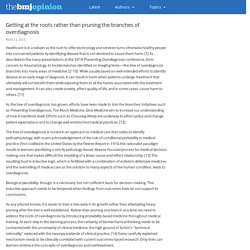
It can also create anxiety, affect quality of life, and in some cases, cause harm to others. [11] As the tree of overdiagnosis has grown, efforts have been made to trim the branches. Biological plausibility, though, is a necessary, but not sufficient basis for decision-making. Allen F. The Case for Being a Medical Conservative. Just 441 Ontario family doctors order nearly 40 per cent of tests considered unnecessary, study finds.
A small group of Ontario family doctors is responsible for ordering a disproportionate amount of unnecessary screening tests on patients, new research shows.
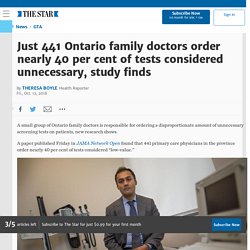
A paper published Friday in JAMA Network Open found that 441 primary care physicians in the province order nearly 40 per cent of tests considered “low-value.” This subset of the province’s 11,448 family doctors demonstrates “a general pattern of overuse,” according to the study by researchers at the Institute for Clinical Evaluative Sciences (ICES) and Women’s College Hospital. Lead author Dr. Healthcare Triage: Stop It! Why It's Tough to get Doctors to Drop Treatments.
Overdiagnosis in primary care: framing the problem and finding solutions. Minal S Kale, assistant professor1, Deborah Korenstein, chief of the general internal medicine service2Author affiliationsCorrespondence to: D Korenstein korenstd@mskcc.org Abstract Overdiagnosis, is defined as the diagnosis of a condition that, if unrecognized, would not cause symptoms or harm a patient during his or her lifetime, and it is increasingly acknowledged as a consequence of screening for cancer and other conditions.
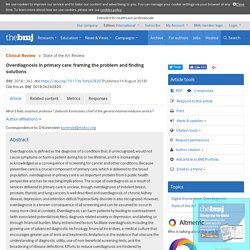
From Defensive Medicine to Quaternary Prevention: The Transition That Pakistan Needs. Richard Smith: The case for medical nihilism and “gentle medicine” - The BMJ. Most practising doctors are instinctive medical nihilists, argues Richard Smith Jacob Stegenga, a philosopher of science in Cambridge, has written a closely argued and empirically supported book in which he argues the case for medical nihilism by which he means that our confidence in the effectiveness of medical interventions should be low.
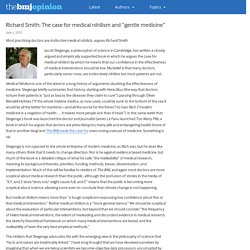
My belief is that many doctors, particularly senior ones, are instinctively nihilists but most patients are not. Bmj. e020355. Barbara Ehrenreich: Why I'm Giving Up on Preventative Care. In the last few years I have given up on the many medical measures—cancer screenings, annual exams, Pap smears, for example—expected of a responsible person with health insurance.
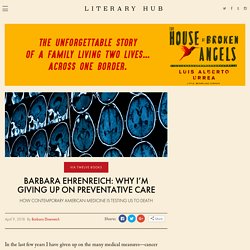
This was not based on any suicidal impulse. It was barely even a decision, more like an accumulation of micro-decisions: to stay at my desk and meet a deadline or show up at the primary care office and submit to the latest test to gauge my biological sustainability; to spend the afternoon in faux-cozy corporate environment of a medical facility or to go for a walk. At first I criticized myself as a slacker and procrastinator, falling behind on the simple, obvious stuff that could prolong my life. After all, this is the great promise of modern scientific medicine: You do not have to get sick and die (at least not for a while), because problems can be detected “early” when they are readily treatable. How medicine got too good for its own good. By Wendy Glauser IN THE 1970s, H.
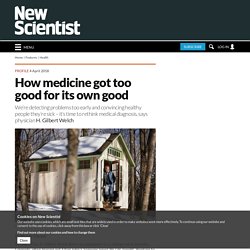
Gilbert Welch drove an ambulance as a college job in Boulder, Colorado, often blaring out Elton John’s Someone Saved My Life Tonight. Wanting to save lives led him to study medicine, but he came to realise that saving lives wasn’t as clear cut as he thought. Sometimes, he found, it can be better to do nothing. Self-insured employers can solve our 'too much medical care' crisis. Unnecessary Medical Care Is More Common Than You Think.
This story was co-published with NPR’s Shots blog. It’s one of the intractable financial boondoggles of the U.S. health care system: Lots and lots of patients get lots and lots of tests and procedures that they don’t need. Women still get annual cervical cancer testing even when it’s recommended every three to five years for most women. Healthy patients are subjected to slates of unnecessary lab work before elective procedures. Doctors routinely order annual electrocardiograms and other heart tests for people who don’t need them. Canada must rethink health spending strategy. If we want a healthier Canada, we should spend less on health care. That's the counterintuitive conclusion of a new study. But, of course, there's a catch: To reap the benefits, we need to spend the savings on social programs such as income assistance, subsidized housing, early childhood education and affordable child care.
The Medical RepublicThe Medical Republic. A movement is growing across the world, driven in part by dedicated doctors here in Australia. It is a response to the uncomfortable knowledge that for all the good medicine has brought to the world, there’s a time to pull back and make sure that patients, and society as a whole, are not being harmed in the pursuit of health. 2017 Update on Medical Overuse A Systematic Review. Importance Overuse of medical care is a well-recognized problem. Objective To identify and highlight original research articles published in 2016 that are most relevant to understanding medical overuse or strategies to reduce it. Evidence Review A structured review of English-language articles on PubMed published in 2016 coupled with examination of tables of contents of high-impact journals to identify articles related to medical overuse in adults. These articles were appraised for their importance to medicine. Findings This study considered 2252 articles, 1224 of which addressed medical overuse.
Brutalist medicine: a reflection on the architecture of healthcare. Benjamin Mazer, resident in pathologyAuthor affiliations Will the fashion for evidence based medicine and technological solutions come to be viewed the same way as brutalist architecture, asks Benjamin Mazer benjamin.mazer@yale.edu The current fashion in medicine is to label things as either “evidence based” or “not evidence based.” We use these labels to describe treatments, diagnostic tests, public health policies, and even people. This dichotomous worldview, however, fails to capture the nuance of the medical landscape.
Unneeded Treatment And Overpriced Services Fuel Health Care Waste. Christina Arenas reviews her medical bills at home in Washington, D.C. Overtreatment in the United States. Preventing Overdiagnosis 2017 - Stacy Carter On The Culture Of Overmedicalisation - The BMJ Podcast. Special Report: The Toll of Over- and Undertesting : Emergency Medicine News. Emergency physician Breena Taira, MD, MPH, sees a certain kind of patient fairly frequently at Olive View-UCLA Medical Center in Sylmar, CA. “A young male, maybe 18 or 19, presents with chest pain,” she said.
“We order an EKG, and maybe an x-ray and blood work, his heart and lungs look fine, and we discharge him home. But then he shows up again a day or two later with the same complaint, and we repeat the whole thing.” Finally, after his third or fourth visit to the county-funded hospital, someone will think to ask the young man what else is going on in his life, and if everything is OK at home.
391: More Is Less. El arte de hacer el mínimo daño en salud mental (Por Alberto Ortiz Lobo) Too much medical care: bad for you, bad for health care systems. Ere’s a question to ask your doctor: Have you ever had a patient who suffered from getting too much medical care? Assuming she has the time and the inclination to talk, I bet you’ll hear an interesting story.
Too Much Medicine: some reflections - Students 4 Best Evidence. Posted on May 19, 2017. Screening and overdiagnosis: public health implications. When evidence says no, but doctors, patients, and the system say yes. There is an interesting article from ProPublica called When evidence says no, but doctors say yes making the rounds about the number of doctors who disbelieve, or don’t know, or don’t care about the medical evidence to the detriment of patients. Turning Value-Based Health Care into a Real Business Model - NEJM Catalyst. When Evidence Says No, but Doctors Say Yes - The Atlantic. First, listen to the story with the happy ending: At 61, the executive was in excellent health. His blood pressure was a bit high, but everything else looked good, and he exercised regularly. Then he had a scare. The real challenge to Canada’s health system is not wait times.
Canada has some of the longest waits for medical care in the developed world. Same-day or next-day appointments with a doctor are difficult to get – and in the evening or on weekends, fuggedaboutit. Waits in the ER can be seemingly endless. Referrals to specialists result in lengthy waits. The wait for elective surgery is often painfully long. One fifth of health spending is wasted, says OECD official. 2016 update on medical overuse. Trevor Hancock: The secret of medicine is masterly inactivity. The complete history and physical examination in primary care: a medical student's view. A definition and ethical evaluation of overdiagnosis. Survey of public definitions of the term ‘overdiagnosis’ in the UK. Diagnosing overdiagnosis: conceptual challenges and suggested solutions.
Overtreatment in threshold and developed countries. Too much medicine? Public Opinions about Overdiagnosis: A National Community Survey: EBSCOhost. Toward a sustainable and wise healthcare approach: potential contributions from hospital Internal Medicine Departments to reducing inappropriate medical spending. Too much medicine is not just a problem of rich countries. Less Is More: How Less Health Care Can Result in Better Health. 'Less Is More': The Next Big Thing for Medicine. What are the risks of overtreating the many to help the few? Screening and overdiagnosis: public health implications. 'Less Is More': The Next Big Thing for Medicine. Dear "Skeptics," Bash Homeopathy and Bigfoot Less, Mammograms and War More.
More Medical Care Isn’t Always Better. OPINION: Health care fire hose. About Quaternary prevention in Public health ; comment on Dr Jong-Myon Bae paper - Jamoulle Marc. Until the white coats show up, this will amount to little more than a fad. Overdiagnosis and overtreatment: generalists — it’s time for a grassroots revolution. Preventing Overdiagnosis - Julian Treadwell. The new holism: P4 systems medicine and the medicalization of health and life itself.
How too much medicine can kill you. BC Medical Journal. Overtesting and the Downstream Consequences of Overtreatment: Implications of “Preventing Overdiagnosis” for Emergency Medicine - Carpenter - 2015 - Academic Emergency Medicine. Update on Medical Practices That Should Be Questioned in 2015. Costly and harmful: we need to tame the tsunami of too much medicine. Safely Doing Less: A Missing Component of the Patient Safety Dialogue. We're overdosing on medicine – it's time to embrace life's uncertainty. Why So Much Of The Health Care We Deliver Is Unnecessary - And What We Can Do About It. The Global Problem With Overdiagnosis and Overtreatment. NHS chief warns one in seven hospital procedures are unnecessary - Home News. Pro/Con: ‘Unnecessary’ Testing. Less is More: The dangers of too much medicine - Students 4 Best Evidence. How risk factors drive medical overtreatment – Jeff Wheelwright. Carlos Martins: Overuse of medical tests—a new health risk factor?
Public Opinions about Overdiagnosis: A National Community Survey. Update on Medical Overuse. America’s Epidemic of Unnecessary Care.
Gawande looks from doctors and patient's viewpoints with heart-wrenching examples to explore what unnecessary care is, how commonplace it is, the factors that drive it, why it is so hard to recognize and overcome. "The one that got me thinking, however, was a study of more than a million Medicare patients. It suggested that a huge proportion had received care that was simply a waste. The researchers called it “low-value care.” But, really, it was no-value care. . . . The forces that have led to a global epidemic of overtesting, overdiagnosis, and overtreatment are easy to grasp. Doctors get paid for doing more, not less. We’re more afraid of doing too little than of doing too much. And patients often feel the same way. They’re likely to be grateful for the extra test done in the name of “being thorough”—and then for the procedure to address what’s found. . . It isn’t enough to eliminate unnecessary care. It has to be replaced with necessary care. And that is the hidden harm: unnecessary care often crowds out necessary care, particularly when the necessary care is less remunerative. " – lessismoremed